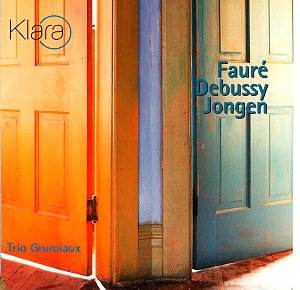Debussy’s
Piano Trio in G major is one of his earliest works,
written when he was barely eighteen. It was long taken for granted
that this was definitively lost until it was found again, almost
a century after its completion. At the time, Debussy composed
the Trio, he was – as it were – a member of Nadejda von Meck’s
household acting as a pianist. Mrs. Von Meck wrote about him to
Tchaikovsky praising his newly composed trio. Not unsurprisingly,
this youthful work, for all its technical competence, only briefly
points towards Debussy’s mature style. Some of the music is fairly
indebted to Franck (particularly so in the outer movements) and
at times bears the imprint of Fauré. Debussy, however,
already briefly comes into his own in the delightful Scherzo
intermezzo. The other movements, as already mentioned, are
somewhat more traditional in style and outlook, although the work
– as a whole – is quite attractive in its own right.
In
total contrast, Fauré’s Piano Trio in D minor Op.120,
completed in 1923, is actually his penultimate completed work,
a commission from his publisher. This magnificent work is one
of Fauré’s sunniest achievements and clearly the product
of the composer’s late maturity. The music unfolds with consummate
ease, melodies flow in complete freedom though everything is tightly
held together. The more remarkable characteristics of this marvellous
piece are, I think, its melodic fluidity, its harmonic subtlety
and its formal elegance.
Jongen
actually composed two different sets of Pièces en trio:
Op.80 for flute,harp and cello (available
on CYPRES CYP 1632 recently reviewed here) and the present
Op.95 for violin, cello and piano. This was completed in 1931
and thus belongs to Jongen’s full maturity. The first panel is
a beautiful Nocturne whereas the second is a lively Allegro
of great verve.
Guido
Defever’s excellent notes are subtitled Youth, maturity and
melancholy. This of course has more than a grain of truth,
although it might be added that there is nothing morbid about
Fauré’s melancholy as expressed in his late Piano Trio.
These works, in spite of their differences, make for a quite unified
programme since Jongen’s musical roots clearly stem from Fauré,
Debussy and Ravel whom he admired and who had a lasting influence
on his music making, although his music never slavishly imitates
that of the French composers.
Beautifully
poised performances by the members of the Trio Grumiaux. I thoroughly
enjoyed this attractive release from first to last. Well worth
having.
Hubert
Culot

![]() Trio Grumiaux (Philippe
Koch, violin; Luc Dewez, cello; Luc Devos, piano)
Trio Grumiaux (Philippe
Koch, violin; Luc Dewez, cello; Luc Devos, piano) ![]() KLARA MMP 036 [62:40]
KLARA MMP 036 [62:40]